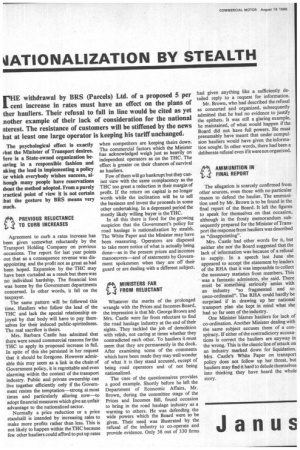dATIONALIZATION BY STEALTH
Page 68

If you've noticed an error in this article please click here to report it so we can fix it.
fHE withdrawal by BRS (Parcels) Ltd. of a proposed 5 per cent increase in rates must have an effect on the plans of ther hauliers. Their refusal to fall in line would be cited as yet nother example of their lack of consideration for the national aterest. The resistance of customers will be stiffened by the news hat at least one large operator is keeping his tariff unchanged.
The psychological effect is exactly vhat the Minister of Transport desires. Iere is a State-owned organization beLaying in a responsible fashion and aking the lead in implementing a policy or which everybody wishes success, alhough many people have reservations ibont the method adopted. From a purely nactical point of view it is not certain hat the gesture by BRS means very much.
riPREVIOUS RELUCTANCE TO CURB INCREASES
Agreement to curb a rates increase has been given somewhat reluctantly by the Transport Holding Company on previous occasions. The report for last year points out that as a consequence revenue was disappointing and the profit not as great as had been hoped. Expansion by the THC may have been curtailed as a result but there was no individual hardship. The financial loss was borne by the Government departments concerned. In other words, it fell on the taxpayer.
The same pattern will be followed this time. Hauliers who follow the lead of the THC and lack the special relationship enjoyed by that body will have to pay themselves for their induced public-spiritedness. The real sacrifice is theirs.
Mrs. Barbara Castle has admitted that there were sound conamercial reasons for the THC to apply its proposed increase in full. In spite of this she persisted in her request that it should be foregone. However admirable this may seem as a link in the chain of Government policy, it is regrettable and even alarming within the context of the transport industry. Public and private ownership can live together efficiently only if the Government resists the temptation—strong at most times and particularly alluring now—to adopt financial measures which give an unfair advantage to the nationalized sector.
Normally a price reduction or a price standstill is intended by increasing sales to make more profits rather than less. This is not likely to happen within the THC because few other hauliers could afford to put up rates when competitors are keeping theirs down. The commercial factors which the Minister has acknowledged weigh just as heavily on independent operators as on the THC. The effect is greater on their chances of survival as hauliers.
Few of them will go bankrupt but they cannot view with the same complacency as the THC too great a reduction in their margin of profit. If the return on capital is no longer worth while the inclination will be to sell the business and invest the proceeds in some other undertaking. In a depressed period the mostly likely willing buyer is the THC.
In all this there is food for the growing suspicion that the Government's policy for road haulage is nationalization by stealth. The White Paper and the Minister may have been reassuring. Operators are disposed to take more notice of what is actually being done—as in the present prices and incomes manoeuvres—and of statements by Government spokesmen when they are off their guard or are dealing with a different subject.
riMINISTERS FAR FROM RELUCTANT
Whatever the merits of the prolonged wrangle with the Prices and Incomes Board, the impression is that Mr. George Brown and Mrs. Castle were far from reluctant to find the road haulage industry at the end of their sights. They tackled the job of demolition with relish, not caring at times whether they contradicted each other. To hauliers it must seem that they are permanently in the dock. After examining some of the comments which have been made they may well wonder of what it is they stand accused, except of being road operators and of not being nationalized.
The case of the questionnaires provides a good example. Shortly before he left the Department of Economic Affairs, Mr. Brown, during the committee stage of the Prices and Incomes Bill, found occasion to bring in the road haulage industry as a warning to others. He was defending the wide powers which the Board were to be given. Their need was illustrated by the refusal of the inaustry to co-operate and provide evidence. Only 38 out of 330 firms had given anything like a sufficiently detailed reply to a request for information.
Mr. Brown, who had described the refusal as concerted and organized, subsequently admitted that he had no evidence to justify the epithets. It was still a glaring example, he maintained, of what would happen if the Board did not have full powers. He must presumably have meant that under compulsion hauliers would have given the information sought. In other words, there had been a deliberate refusal even if it were not organized.




































































































































